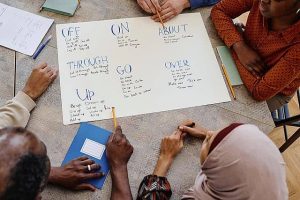Yes, please. No, thank you…
Être poli montre le respect des autres et rend les gens heureux.
Mais à quel point devons-nous être polis ? Quel langage devrions-nous utiliser pour être polis ?
Apprenez comment être poli en anglais grâce à 5 conseils pratiques.
Yes, please. No, thank you – How to be polite in English.
Different countries around the world have different levels of politeness. What is considered normal in Japan may be extremely formal and polite in Russia. What is considered normal in Russia may be considered rude in Japan.
English speaking countries are in general polite. I am from England in the United Kingdom, and some of our customs may seem strange to those from other countries.
For example, we say sorry in public if someone steps on our toe. Shouldn’t it be the other way round?
Our literature and culture are full of people making comments about the importance of good manners. Always arrive 5 minutes early for a meeting. Remain in an orderly position when queuing or waiting in a line. Hold your knife and fork correctly at the dinner table.
It can be confusing when you are using another language and you don’t know how polite you should be.
In today’s podcast let’s look at 5 handy tips that you can use to be more polite in everyday communication which will help you to make a good impression.
But before we look at the tips, let’s look at a famous quote about being polite, not by an Englishman, but by the great German Statesman Otto von Bismarck. After all, German is one of the languages we teach at VivaLing. He said, “Even in a declaration of _______, one observes the rules of politeness.” But what is the missing word? Love, lies or war? Answers at the end of this podcast.
Tip number 1 – Positive language breeds positive results.
Saying sorry is polite and, if you have done something wrong, you must apologise sincerely, but many people apologise when saying thank you would be better. Imagine you are late for a class or a meeting. Our natural reaction is to say, “Sorry I’m late” and give a feeble excuse. “The traffic was terrible.” “I got confused about the time.” Change the negative situation into a positive one by saying, “Thank you for waiting for me. I really appreciate it.” That way, you put the focus onto your partner in a positive way.
Tip number 2 – Please don’t forget to say please.
In some countries it might seem excessive to use please if we are asking a minor favour. In England, please is known as the magic word. Many children are simply taught that, if they don’t use the word please with a request, they won’t get what they want. My mother used to tell me, “I want never gets.” In a shop you should always say, “Please, can I have half a pound of that,” never, “I want half a pound of that.” Nothing is too minor, even if you are asking somebody to pass you the salt. Please use “please.”
Tip number 3 – The power of intonation.
A friendly voice makes language much more polite. When we are using a foreign language, sometimes we are so stressed about getting the words and pronunciation right that we forget to make our voice sound friendly. Listen to the difference between these 2 requests. “Please, can you come round to my office on Friday” and, “Please, can you come round to my office on Friday?” The language is exactly the same, but the effect is completely different.
Tip number 4 – Thank you. I really appreciate it.
Say thank you and say why. Tagging on the reason you are grateful makes your “thank you” more meaningful. It doesn’t need to be very complicated but, “Thank you. I really appreciate it,” “Thank you. That means a lot to me,” or “Thank you. You are very kind” will have more of an effect than just, “Thank you.”
Tip number 5 – If in doubt, overdo it.
Some people think that polite language can be offensive or insincere if it is too polite. They would be afraid of saying, “I don’t suppose you would mind helping me prepare the documents” because A, it’s a complicated grammatical sentence and B, it might sound over the top. But I guarantee that for the person receiving the request, the more polite the language, the more likely they are to agree to it.
Let’s follow a scale
- Come here and help me with this document.
- Please, can you come here and help me with this document?
- Would it be possible for you to come here and help me with this document?
- I don’t suppose you would mind coming here and helping me with this document.
- I would be extremely grateful if you could come here and help me with this document.
Never use level 1 and always use at least level 2.
Thank you for listening to this podcast. I would be most grateful if you could follow some of my tips. Politeness makes people respect each other more, so we are all sowing seeds for future happiness.
But before we finish, what about our little question?
What was Otto Von Bismarck’s quote about politeness? Even in a declaration of love, lies, war do we need to observe the rules of politeness? Well, there’s nothing very polite about it, but war is the correct answer. And if that’s what Mr Bismarck thought, who am I to disagree?





